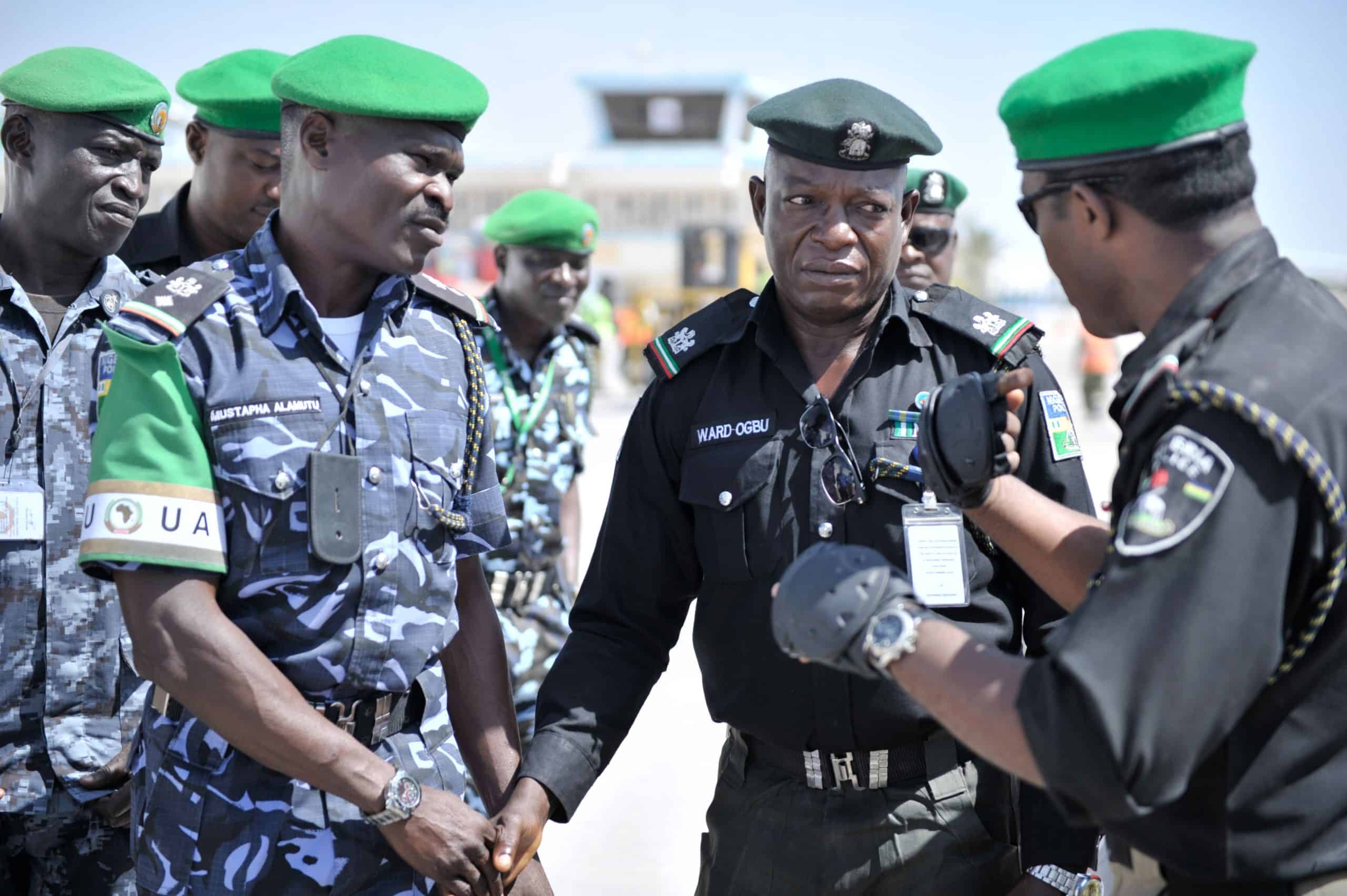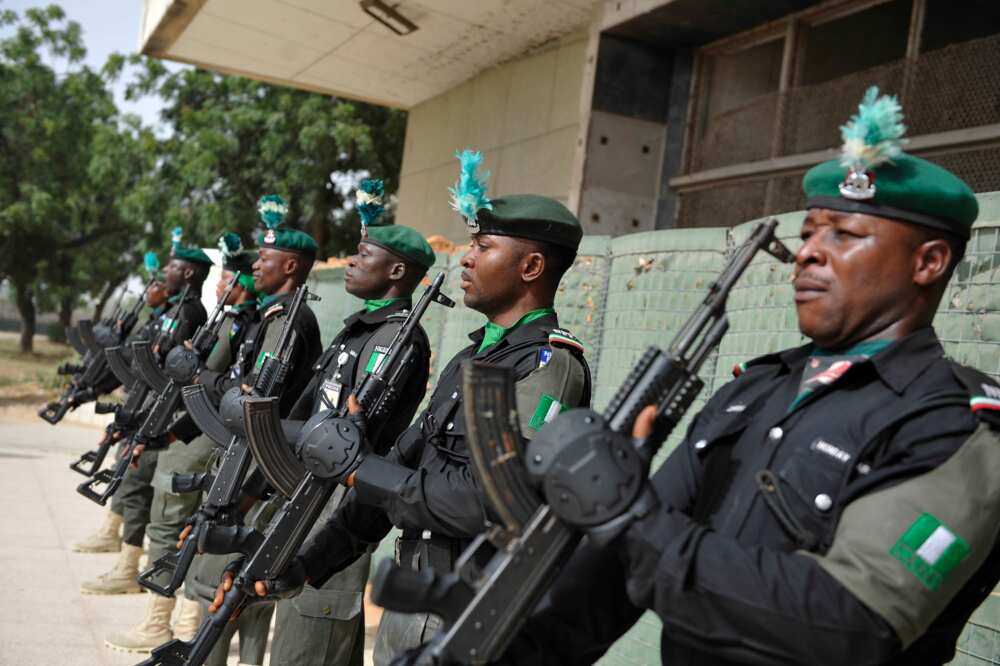Does the structure of police ranks in Nigeria truly dictate the effectiveness of its law enforcement? Understanding the intricate hierarchy, the specific duties tied to each rank, and the overall operational framework is paramount to comprehending the complex dynamics of maintaining law and order in the nation.
The Nigerian Police Force (NPF), established in 1930, stands as the primary law enforcement agency in the country. Its mandate is clear: to ensure the safety and security of the public, and to uphold the rule of law. Over the decades, the NPF has adapted to the ever-changing landscape of Nigerian society, evolving its strategies and approaches to address the growing complexities of crime and public safety concerns. Recognizing the significance of police ranks within the NPF offers civilians a better understanding of the chain of command, which helps foster a culture of respect for authority, and allows them to appreciate how law enforcement functions at various levels.
The following table provides a concise overview of the different police ranks in Nigeria, detailing their abbreviations and responsibilities. This foundational knowledge is crucial for grasping the operational structure of the NPF.
- Unveiling Leo George Faulkner Biography Achievements Legacy
- Sabrina Nicole Rising Star Her Biography Career Unveiled
| Rank | Abbreviation | Responsibilities |
|---|---|---|
| Inspector General of Police | IGP | Overall head of the police force. |
| Deputy Inspector General of Police | DIG | Assists the IGP in managing the police force. |
| Assistant Inspector General of Police | AIG | Oversees specific zones or regions. |
| Commissioner of Police | CP | In charge of a state or large unit. |
| Deputy Commissioner of Police | DCP | Assists the CP in managing police operations. |
| Assistant Commissioner of Police | ACP | Supervises specific departments. |
| Chief Superintendent of Police | CSP | Manages police divisions. |
| Superintendent of Police | SP | Leads police units. |
| Deputy Superintendent of Police | DSP | Assists the SP in unit management. |
| Assistant Superintendent of Police | ASP | Entry-level management position. |
| Inspector | INS | Oversees constables and investigations. |
| Sergeant | SGT | Supervises constables. |
| Corporal | CPL | Assists sergeants in their duties. |
| Constable | CPL | Entry-level rank in the police force. |
The foundation of the NPF rests on its lower ranks. These individuals are the first responders, the foot soldiers, and the constant presence on the streets, working diligently to ensure public safety. The effectiveness of their actions directly impacts the public's trust and confidence in the police force.
Constable
The Constable is the entry-level rank. They are responsible for patrolling designated areas, responding to emergency calls, and providing initial assistance at crime scenes. Constables are often the first point of contact between the public and the police. They play a vital role in community policing, building relationships and gathering crucial information.
Corporal
The Corporal serves as a bridge between the Constables and the Sergeants. They assist Sergeants in supervising Constables and may take on additional responsibilities, such as leading small teams during operations. Their experience and guidance are essential for the development and effectiveness of junior officers.
- Selling Sunset Salaries How Much Does The Cast Really Earn
- Remembering Actresss Name A Tribute To Her Life Legacy
Sergeant
The Sergeant's role is crucial. Sergeants are tasked with overseeing the daily activities of Constables and Corporals, ensuring that operations are conducted efficiently and professionally. They are responsible for reporting on their team's performance to higher ranks, offering mentorship, and maintaining discipline within their units. A competent Sergeant is often the key to a well-functioning and effective police unit.
The middle ranks form the operational engine of the NPF, managing units, overseeing investigations, and implementing policies. They bridge the gap between the lower ranks and the higher echelons of command, ensuring that directives are carried out effectively and that resources are allocated appropriately.
Assistant Superintendent of Police (ASP)
The ASP holds an entry-level management position. They often oversee specific units or departments, such as investigations, patrol, or administration. Their role is critical in ensuring that police operations align with the force's overall goals and objectives. They are involved in planning, organizing, and directing the activities of their assigned units.
Deputy Superintendent of Police (DSP)
The DSP assists the Superintendent in managing police units. They often take on significant responsibilities, including leading investigations, managing administrative tasks, and supervising personnel. They play a crucial role in implementing policies and procedures, ensuring that the unit operates in accordance with the law and departmental guidelines.
Superintendent of Police (SP)
The SP is a significant leadership position. They are responsible for leading police units, managing personnel, and ensuring that operations run smoothly. They are accountable for the effectiveness of their unit and report directly to higher-ranking officials, such as the Commissioner of Police or Deputy Commissioner of Police. Their leadership skills and strategic thinking are essential for maintaining order and responding to complex situations.
Chief Superintendent of Police (CSP)
CSPs manage entire divisions, overseeing a range of police activities within their jurisdiction. They are responsible for strategic planning, resource allocation, and the implementation of policies. They play a vital role in maintaining law and order, ensuring the safety and security of the community, and building relationships with local stakeholders. Their decisions have a broad impact on the effectiveness and public perception of the police force.
The higher ranks of the NPF are responsible for strategic command, oversight of large areas, and policy implementation. These individuals provide leadership, guidance, and direction to the entire force, ensuring that it operates effectively and ethically.
Assistant Commissioner of Police (ACP)
The ACP supervises specific departments within the police force, ensuring that policies and procedures are followed. They often assist in strategic planning and resource management, playing a crucial role in the efficient and effective operation of the force. They may also be responsible for training and development programs.
Deputy Commissioner of Police (DCP)
The DCP assists the Commissioner in managing police operations at the state level. They are responsible for policy implementation, supervision of police activities, and coordination with other law enforcement agencies. Their responsibilities often include overseeing investigations, managing budgets, and addressing community concerns.
Commissioner of Police (CP)
The CP is in charge of a state or a large unit within the police force. They oversee all police activities within their jurisdiction and are responsible for maintaining law and order. Their decisions have a direct impact on the safety and security of the citizens within their area of responsibility. They are accountable for the overall performance of the police force under their command.
Deputy Inspector General of Police (DIG)
The DIG assists the Inspector General in managing the police force. They may be responsible for overseeing multiple states or departments, ensuring that policies are implemented effectively across jurisdictions. Their role is to provide strategic leadership and support to the IGP, ensuring that the force operates efficiently and effectively across the nation.
Inspector General of Police (IGP)
The IGP is the highest-ranking officer in the Nigerian Police Force. They are responsible for the overall management and administration of the force, setting policies, and ensuring public safety across the nation. The IGP is accountable for the performance and conduct of the entire police force, ensuring that it operates within the framework of the law and in the best interests of the public.
The process of joining the Nigerian Police Force is designed to identify and recruit individuals who are suitable for the demanding role of law enforcement. The recruitment process is multi-staged, and it aims to ensure the selection of competent, qualified, and committed officers.
- Application Submission: Interested candidates submit their applications online or at designated recruitment centers, providing basic biographical information and outlining their qualifications.
- Screening: Candidates undergo a preliminary screening process to verify their qualifications, educational background, and eligibility based on specific criteria, such as age and nationality.
- Physical and Medical Examination: Candidates are required to pass physical fitness tests and undergo comprehensive medical examinations to assess their health and physical ability to perform the duties of a police officer.
- Written Examination: Successful candidates take a written examination that assesses their knowledge, aptitude, and suitability for the police force. The examination covers a range of topics, including general knowledge, current affairs, and reasoning skills.
- Interview: Candidates who pass the written examination are interviewed by senior police officers. The interview is designed to assess their character, communication skills, and suitability for a career in law enforcement.
- Training: Selected candidates undergo rigorous training at police academies before being assigned to their respective ranks. The training provides them with the necessary skills, knowledge, and values to perform their duties effectively and professionally.
The Nigerian Police Force faces a myriad of challenges that impact its ability to effectively maintain law and order. These challenges include, but are not limited to, inadequate funding, insufficient training, corruption, and a lack of modern equipment. Addressing these issues requires a multi-faceted approach, including increased funding, improved training programs, the adoption of technology, and a commitment to ethical conduct and accountability.
Challenges Faced by the Nigerian Police:
- Inadequate Funding: Insufficient financial resources hinder the ability of the NPF to provide adequate equipment, training, and resources to its officers.
- Insufficient Training: A lack of comprehensive and up-to-date training programs can limit the effectiveness of officers in handling complex situations and using modern law enforcement techniques.
- Corruption: Corruption remains a significant challenge, eroding public trust and undermining the legitimacy of the police force.
- Lack of Modern Equipment: The absence of modern technology and equipment, such as vehicles, communication systems, and forensic tools, can hamper investigations and response times.
- Poor Public Perception: Negative perceptions of the police, often stemming from instances of misconduct or corruption, can hinder cooperation between the police and the public.
- Inadequate Welfare: Poor working conditions, low salaries, and a lack of social support can negatively affect officer morale and performance.
- Tom Kaulitz From Tokio Hotel Guitarist To Rock Icon Explore His Life
- Maddison Beer Leaked Nudes Privacy Consent Celebrity Culture


